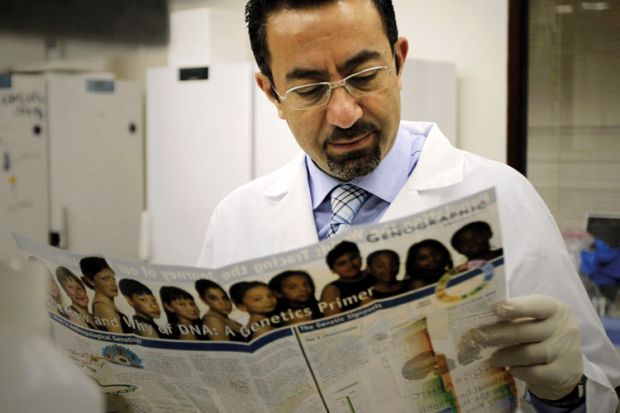Musing on the enticements offered to researchers considering relocation by leading universities in the oil-rich Gulf, Pierre Zalloua asks: “How can we compete?”
As dean of graduate studies and research at the Lebanese American University, Dr Zalloua knows that finding the answer to that question will be challenging in a country that has been plagued by political instability and is not blessed with oil reserves.
Lebanon has higher education institutions that, like LAU, have proud histories, Dr Zalloua told Times Higher Education. But in the race for global research excellence, and to attract leading academics, they have fallen behind.
“Research today is so technologically driven, requiring huge sources of funding and requiring a mindset that we seem not to be grasping or have not grasped in time,” he said.
“Because of all the havoc that the country and the region have been going through, we have missed a step and now we are catching up.”
In the absence of significant public investment, Lebanon’s universities know that they will have to focus on their strengths and carve out a niche for themselves.
In the case of LAU, these strengths include genetic and infectious diseases, engineering and telecommunications, as well as gender studies.
“We want to focus on themes and hire people to promote these areas of focus to distinguish LAU from other universities in the region – so we are not competing, so we are making a distinct path,” Dr Zalloua said. “This strength will have to be translated into impact in the society that we are located in – that’s how you sustain it.”
The research priorities elsewhere in Lebanon may be different: for example, at Beirut Arab University, they include pharmaceuticals and renewable energies.
But Hania Nakkash, the Arab university’s dean of postgraduate studies and research, said that Lebanese higher education institutions will also have to work together to build a culture of innovation.
“We are looking at collaboration with other universities, in terms of research and in terms of finding grants together,” Professor Nakkash said. “There are signs of positivity.”
Dr Zalloua agrees. The long history of “collaboration and healthy competition” between Lebanese universities is one area where they have a head start over their Gulf rivals, he said. At the same time, Lebanese universities do not want to lose sight of the important teaching and learning roles that they have played for so long.
If the research culture improves, and if the economy grows as a result, university leaders hope that more of their graduates can be persuaded to stay in Lebanon and build a better future for the country.
For Professor Nakkash, this is a key way in which Lebanon’s universities fulfil their mission. Graduates of the Arab university, she said, were taught to be “hard workers” and “competitors”.
“We teach intensively in our university: we raise them to be tough, and they are,” she said. “Our country has not been stable for ages, so we need to have people with strong personalities, determination and perseverance.”
Register to continue
Why register?
- Registration is free and only takes a moment
- Once registered, you can read 3 articles a month
- Sign up for our newsletter
Subscribe
Or subscribe for unlimited access to:
- Unlimited access to news, views, insights & reviews
- Digital editions
- Digital access to THE’s university and college rankings analysis
Already registered or a current subscriber? Login





